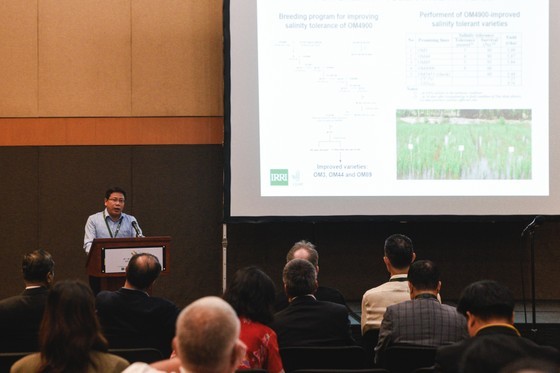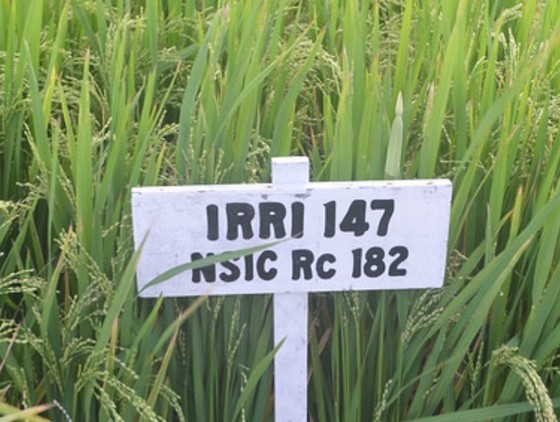 |
At the opening ceremony of IRC 2023 (Photo: IRRI) |
At the ongoing International Rice Congress - IRC 2023, which is progressing into its second day and running until October 19, Dr. Tran Ngoc Thach, Director of the Mekong Delta Rice Research Institute, introduced a project aimed at selecting and popularizing advanced salt-tolerant rice varieties.
The Mekong Delta Rice Institute has acquired around 40 salt-tolerant rice strains from international rice research centers. Following trials in Soc Trang, Bac Lieu, and Ca Mau provinces, the top-performing rice varieties have been identified as IRRI147 and IRR117839-22-15-B-CMU10-1-B. These varieties will undergo additional large-scale testing before being introduced into production in Soc Trang Province, the area most heavily impacted by saltwater intrusion in Vietnam.
 |
Dr. Tran Ngoc Thach, Director of the Mekong Delta Rice Research Institute, introduces salt-tolerant rice varieties of Vietnam. |
As part of the Asian Mega-Delta Initiative, this October, the Mekong Delta Rice Research Institute is partnering with the International Rice Research Institute (IRRI) to implement the project "Ensuring the food systems of the Asian subcontinents by identifying salt-tolerant rice varieties in Vietnam."
Accordingly, rice varieties will be trialed in the salinity "hotspots" of three provinces within the Mekong Delta, employing the rice-shrimp model in Soc Trang, the rice-dryland crop model in Tien Giang, and the rice-rice model in Kien Giang.
 |
Earlier, the groundbreaking discovery of a rice variety with potential diabetes-preventive properties was unveiled at the IRC 2023, resulting from extensive research conducted by scientists at the IRRI.
During the opening ceremony of the IRC 2023, which took place in Manila, Philippines, from October 16 to 19, the first sample of rice with an exceptionally low glycemic index (GI) was showcased to the President of the Philippines, Ferdinand Marcos Jr.
In an effort to mitigate the worldwide diabetes risk, researchers from the IRRI and the CGIAR have discovered genes that reduce the GI of rice. This significant scientific advancement facilitates the conversion of traditional rice strains into low-GI varieties, all while preserving yield as well as grain quality.
IRRI categorizes rice GI levels as follows: below 45 is classified as extremely low, 46-55 as low, 56-69 as medium, and 70 and above as high. The most recent rice variety with an exceptionally low GI boasts a GI of 44.
During the congress, Mr. Cao Duc Phat, Chairman of the IRRI Board of Trustees and former Minister of Agriculture and Rural Development of Vietnam, conveyed a significant message. In light of the increasing concern among consumers regarding nutrition and food quality, he stressed the pressing need for IRRI to transition the rice system towards diversity, sustainability, and eco-friendliness.
 |
Mr. Cao Duc Phat, Chairman of the IRRI Board of Trustees and former Minister of Agriculture and Rural Development of Vietnam, speaks at the event. (Photo: IRRI) |
Diabetes is on the rise globally. According to the International Diabetes Federation, in 2021, there were 537 million people living with diabetes, and this number is projected to increase by 47 percent by 2047. Despite their high quality, many rice varieties currently in cultivation have GI values ranging from 70 to 92, which is detrimental to the health of individuals with diabetes.
In 2019, IRRI discovered specific genetic markers that hold great significance in differentiating between rice varieties with medium and high GI. This represents a pioneering breakthrough in scientific advancements toward producing high-yield rice varieties with low GI.
IRRI's Director General, Ajay Kohli, stated that through that research, their primary aim is to safeguard the well-being of consumers. They are looking forward to collaborating with nations to accelerate the adoption of rice varieties with low and extremely low GI.
























